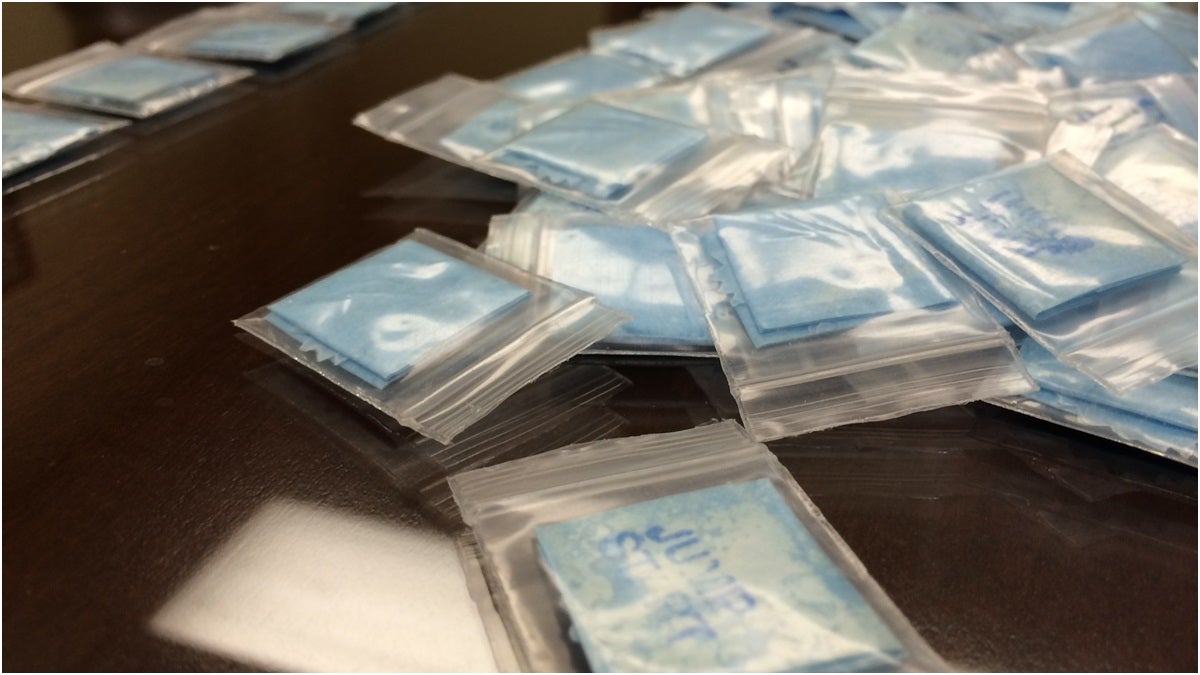New recommendations for fighting Delaware’s addiction crisis

Bags of heroin confiscated by Wilmington Police (Shirley Min/WHYY)
While the state has made progress in the fight against heroin and opioid addiction, Delaware Attorney General Matt Denn said more needs to be done.
Joined by anti-addiction advocates, health professionals and law enforcement during a news conference in Dover on Wednesday, Denn highlighted four areas he said should be addressed by the state over the next year. They include:
The creation of more treatment opportunities for persons with substance use disorder;
Review of the state’s private insurance and Medicaid regulations to ensure that persons struggling with addiction are not ‘forced to fail,’ before getting access to appropriate treatment;
Increased use of the state’s prescription drug monitoring system to flag potential criminal conduct or medically questionable prescription practices to the appropriate authorities;
Improved communication with the state’s medical community with respect to overdoses by their patients.
“It is impossible for us to ignore the crushing impact that drug trafficking has on both violent crime and property crime in our state,” said Denn, during a news conference in Dover on Wednesday. “And just as importantly, it is impossible for anyone to ignore the pain that drug addiction and overdoses have inflicted on so many of our friends and neighbors. So at the same time as we continue to aggressively prosecute drug dealing cases, I am determined to keep advocating for solutions to our state’s substance abuse crisis.”
“The Attorney General’s leadership in fighting the prescription drug epidemic is vital. Public Health is pleased to partner with him as we work across the spectrum to reduce overdoses,” said Dr. Karyl Rattay, director of the Division of Public Health.
Denn also reviewed what has been accomplished since outlining a 4-part plan to combat Delaware’s drug abuse epidemic last year.
Three of the recommendations have been implented in large part:
Stronger state regulation of prescription painkillers
Tightening restrictions on the prescription of opioids to require more diligence and oversight by doctors.
Formal review of overdose deaths caused by heroin and prescription opiates
Earlier this year, legislation was passed creating a Drug Overdose Fatality Review Commission. The commission held its first meeting on Wednesday and will make evidence-based recommendations to the state in annual reports for the state.
Expanding use of Naloxone by law enforcement officers
The number of police departments in Delaware with officers carrying the drug that reverses the effects of an opioid or heroin overdose has increased from six to 23 over the last year.
Denn also recommended expanding treatment facilities, specifically medically assisted treatment facilities, in the state. Because state funding was not approved to make it possible last year, it topped his priority list for the coming year.
“One overdose death is one too many,” said Rita Landgraf, secretary of the Delaware Dept. of Health and Social Services. “We have to be ready when people are ready to get help and stop punishing people for having a disease.”
“We’re in the middle of an opiate epidemic. Business as usual isn’t working,” said Dr. Terry Horton, Chair of the Drug Overdose Fatality Review Commission. “We need to come up with creative methods to understand and learn about the nature of the epidemic, and then to be able to come up with smart recommendations to address it.”
WHYY is your source for fact-based, in-depth journalism and information. As a nonprofit organization, we rely on financial support from readers like you. Please give today.


